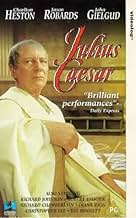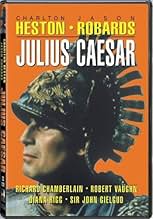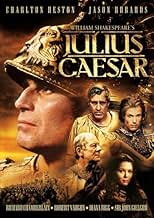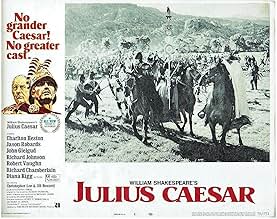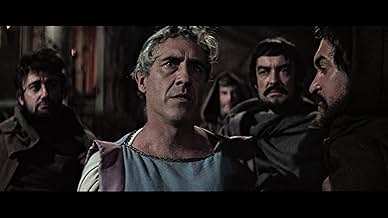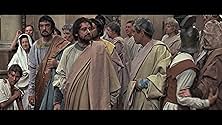La creciente ambición de Julio César preocupa mucho a su íntimo amigo Bruto. Casio le convence para que participe en su complot para asesinar a César, pero ambos han subestimado a Marco Anto... Leer todoLa creciente ambición de Julio César preocupa mucho a su íntimo amigo Bruto. Casio le convence para que participe en su complot para asesinar a César, pero ambos han subestimado a Marco Antonio.La creciente ambición de Julio César preocupa mucho a su íntimo amigo Bruto. Casio le convence para que participe en su complot para asesinar a César, pero ambos han subestimado a Marco Antonio.
- Dirección
- Guionistas
- Elenco
- Julius Caesar
- (as Sir John Gielgud)
- Dirección
- Guionistas
- Todo el elenco y el equipo
- Producción, taquilla y más en IMDbPro
Opiniones destacadas
Featuring a mixed cast of British and American actors, the result is mainly predictable but some surprises and disappointments also feature. One disappointment is Gielgud as Caesar. Sir John was a veteran Shakespearian by 1970 with a fine voice and tons of dignity. Yet at sixty-six he was a touch too old for the part. More to the point, the effete Gielgud lacked the masculine force to play this virile ex-general whose battlefield victories were said to be matched only by his conquests in the bedroom.
One surprise is the subtle portrayal of the conspirator Casca by American Robert Vaughan. "Sour" Casca, the cynical observer, is a minor character but sharply drawn and Vaughan makes him come alive during his few minutes on stage. Jill Bennet is sympathetic as the prophetic wife of Caesar but in the role of Brutus' wife the well-born Portia, Diana Rigg at age thirty-two looks luscious and is simply superb--Shakespeare in the finest style. Another veteran Shakespearian, Richard Johnson, is nearly as good as the jealous, manipulative Cassius.
Jason Robards plays Brutus like a wooden Indian for the first two acts. In the third act however--that is, after Brutus and Cassius have fled Rome--he seems to grow in the part and his acting gains conviction.
The importance of the plebeians to the play was understood by this director, who cast the roles carefully.
Antony and Brutus are each worried about their place in Caesar's affections and Brutus figures he's lost out to Antony. It makes him an easy mark for Cassius's plots. After the dirty deed of assassination is done, it's Antony and Octavius though they are teaming up against the conspirators, you can tell both in this version and in the better Fifties version that MGM put out that they will soon be at odds.
Charlton Heston is a strong Antony here, but unfortunately for the play to succeed you need an equally strong Brutus. That's not what you get in Jason Robards, Jr. For a man who in his time was considered the greatest interpreter of Eugene O'Neill, when it comes to Shakespeare the man was out of his league. No reflection on him, everyone has casting limitations.
A real good interpreter of the Bard who played Cassius back in 1954 plays Caesar here. John Gielgud is equally fine in both versions. And Richard Johnson and Robert Vaughn are superb as conspirators Cassius and Casca. And Richard Chamberlain who was trying very hard to shed his Dr. Kildare image is fine as the cunning Octavian who Antony ultimately underestimates.
Charlton Heston in his memoirs takes blame for casting Robards and Robards himself realized he was miscast. Oddly enough in that earlier version James Mason as Brutus was the best one in the film.
Watching the film again recently for the first time since my schooldays made me think that I could have chosen a better cinematic introduction to the works of the Bard. It is a prime example of how one poor performance can spoil a film which might otherwise have been a good one. The film was not popular with the critics, and most of their reviews placed the blame for its shortcomings on the actor playing Brutus, Jason Robards. Howard Thompson calls him "incredibly dull and wooden", but that description seems like the highest praise compared with what Roger Ebert had to say, accusing Robards of staring vacantly into the camera and reciting Shakespeare's words as if he'd memorized them seconds before, or maybe he was reading from idiot cards. Now there were occasions when Ebert could allow his rhetoric to run away with him, but this was not one of them. Robards's performance was inert and soulless and betrayed an inability to speak Shakespearean verse convincingly. It fully deserved everything Ebert said about it.
This is unfortunate, because Brutus is the key role in the play. Although the title is "Julius Caesar", Brutus, the leader of the conspirators who plot to kill Caesar because they believe he is planning to establish a dictatorship, is the most prominent character in terms of time on stage and of lines spoken, far more prominent than Caesar, who dies halfway through. In fact, Brutus can be seen as the tragic hero of the play. Even his enemy Mark Antony dubs him after his death "the noblest Roman of them all", pointing out that while the other conspirators acted out of envy or resentment of Caesar, Brutus alone was motivated by idealism. He was regarded by Caesar as a friend, but concluded after a struggle with his conscience that his ideals of liberty and patriotism counted for more than friendship. So the role of Brutus, perhaps more than any other character in the play, demands a great performance. It got such a performance from James Mason in 1953; it did not get one here.
Gielgud has been criticised on this board for being insufficiently "virile", but this strikes me as a misguided criticism. The historical Caesar may well have been as much a conqueror in the bedroom as he was on the battlefield, but that is not how Shakespeare portrays him. His Caesar is ageing and diminishing in physical strength; stress is laid upon his physical infirmities, such as epilepsy and deafness. His strength is political, not physical, and this is how Gielgud plays him, as a successful general turned elder statesman who knows that his support is based both upon the legions at his back and on the support of the Roman populace, who have little reason to love the Republic which has always represented the interests of the patrician class. From a 20th century viewpoint the play was often interpreted as being about the clash of dictatorship versus democracy; from the viewpoint of the 21st it is startling to look more like authoritarian populism versus elitist liberalism
I liked Diana Rigg as Brutus's wife Portia, one of only two female characters of any significance. The other is Caesar's wife Calpurnia; this is one of Shakespeare's most masculine plays, revolving as it does around what were (in Shakespeare's day as well as Caesar's) two very male pursuits, politics and war. Other good performances came from Richard Johnson as a direct, blunt Cassius and from Robert ("Man from UNCLE") Vaughn- not the first actor I would have thought of for the role- as Casca. The best, however, comes from Charlton Heston as Mark Antony, a role he was to reprise two years later when he directed his own version of "Antony and Cleopatra". Although the two plays are very different in tone, Heston's Antony is recognisably the same character in both films- a sportsman, a sensualist and a skilled political operator, the polar opposite of the puritanical, priggish Brutus. Unfortunately, Robards is so poor that in the great rhetorical duel when Brutus ad Antony both address the crowds after Caesar's death, Antony wins by default.
Despite Robards's inadequate contribution, however, I have awarded the film an above-average mark, because to do otherwise would be unfair to the rest of the cast, some of whom are very good. It would also be unfair to Shakespeare, who cannot be held responsible for how actors perform his works, and this is one of his most fascinating plays. I would, however, recommend that any English teachers hoping to use the cinema to introduce their pupils to Shakespeare should show them the much better 1953 version. 6/10
¿Sabías que…?
- TriviaRobert Vaughn says in his memoirs that Jason Robards, Jr. was very unhappy during the filming period, and dubious about the end result.
- ErroresCassius drinks from a wooden cup during the riot scene. When he throws the wooden cup it makes a sound as if it was glass.
- Citas
Julius Caesar: Let me have men about me that are fat; Sleek-headed men, and such as sleep o' nights. Yond Cassius has a lean and hungry look; He thinks too much: such men are dangerous.
- ConexionesFeatured in History Buffs: Rome Season Two (2017)
Selecciones populares
- How long is Julius Caesar?Con tecnología de Alexa
Detalles
- Fecha de lanzamiento
- Países de origen
- Sitio oficial
- Idioma
- También se conoce como
- Julio César
- Locaciones de filmación
- Productora
- Ver más créditos de la compañía en IMDbPro
- Tiempo de ejecución1 hora 57 minutos
- Mezcla de sonido
- Relación de aspecto
- 2.35 : 1
Contribuir a esta página


